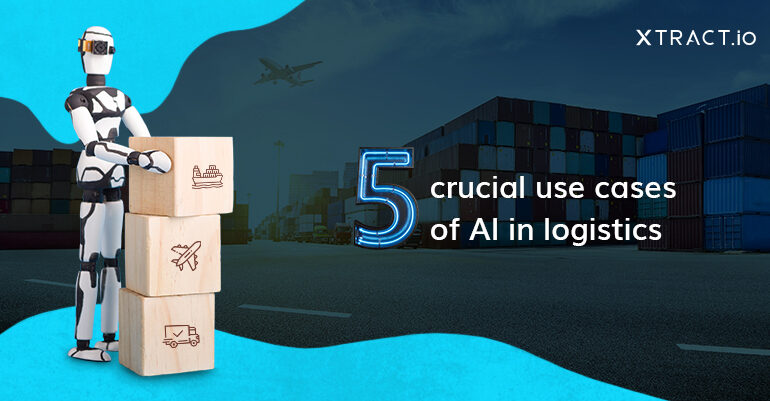Logistics is one of the most important industries worldwide as logistics ensure the flow and storage of goods and services to meet consumers’ needs and requirements. In 2020, due to the global pandemic, the logistics industry’s size shrank to 5.73 trillion euros. By 2024, the projections hint at the industry exceeding 6.8 billion euros. Implementing AI in logistics can help the industry achieve its market share successfully.
What is logistics?
Logistics is a component of supply chain management that helps organize, execute, and manage goods’ adequate flow and storage. It involves dealing with important information about the products – the point of origin and the point of consumption to ensure meeting consumer expectations in time. Logistics includes transportation, storage, warehousing, packaging, and more.
The purpose of logistics is to ensure that consumers worldwide receive the required product and services at their desired time and place. And artificial intelligence can be a game-changer for logistics companies by helping them optimize their efficiency and cutting costs.
What is AI? And what are its applications in the logistics industry?
In simple terms, AI is the intelligence exhibited by machines against the natural intelligence displayed by humans. AI has been impacting our lives for quite some time now. Today, AI aids us in almost every part of our lives, be it reading emails, finding driving directions, setting up appointments, or finding movie recommendations. We use AI multiple times in our daily activities. Similarly, businesses across industries use artificial intelligence to assist and improve their operations, communications, and productivity, mainly through automation.
AI in logistics has gained more importance post-pandemic due to the disruptions caused in the supply chain planning and logistics capabilities. Today, the logistics industry can leverage AI to organize and improve logistics operations. A recent study shows that AI has helped logistics companies improve their services by 65%, inventory levels by 35%, and logistics costs by 15%.
Let’s explore the five crucial use cases of AI in logistics.
Effectively planning demand and supply logistics
Logistics is all about supply chain planning. It requires companies to coordinate with suppliers, distributors, consumers, and different teams within the organization. AI can help companies utilize real-time and historical data to forecast demand based on previous trends and present-day situations. One significant advantage of AI is that AI-powered forecasting is highly accurate compared to the traditional manual methods with a higher error rate.
High accuracy in demand forecasting helps manufacturers optimally use their vehicles and staffing dispatched to local warehouses, thereby reducing operational costs. Also, local retailers or warehouses can visibly cut down on storage/holding costs by leveraging the data. Demand prediction also means that customers are unlikely to experience stock shortages.
AI in supply chain planning enables businesses to evaluate demand instantly and manage supply chain flow in real-time. Thus, dynamic planning ensures companies use resources efficiently and minimize waste.
Successfully operating automated warehouses
A growing number of businesses use AI technology in their warehouse operations. Warehouse robots are one such technology that is heavily invested in to enhance supply chain management. The most prominent example is Amazon, with over 200K robots helping humans pick, sort, transport, and stow the product packages in their warehouses.
Computer vision is another technology used to detect product damages as a part of visual inspection. Customers want their products delivered intact, and a slightly damaged product can cause dissatisfaction and lead to customer churn. With AI in logistics, businesses can evaluate the damage extent and cause and decide on further actions.
AI further helps warehouses predict potential machine failures by studying real-time data collected from IoT sensors present in the machines. ML-powered analytics tools provide accurate predictions and spot patterns in data enabling technicians to fix the machines before any mishaps happen.
Leveraging analytics for route optimization
AI in logistics can help companies cut costs by identifying the best route for logistics vehicles. AI models can analyze existing delivery routes and track other shorter routes using shortest path algorithms. Therefore, helping companies reduce shipping costs and quicken shipping times.
Although, for autonomous vehicles and users, multiple AI-powered traffic management platforms provide information about the route and the route conditions. Additionally, route optimization can help logistics companies reduce carbon emissions by choosing shorter and better ways to deliver products.
Increasing the use of autonomous devices
Autonomous devices rely entirely on AI to function and require zero to minimum human interaction to perform. These devices include self-drive vehicles, drones, and robots. With advancements in automation and its suitability for the industry, it is predicted that more autonomous machines will be used for better results.
Self-driving vehicles hold vast potential in transforming the logistics industry by minimizing its heavy reliance on human drivers. Off late, Tesla, Google, and Merc Benz are investing in the idea of autonomous vehicles. Delivery drones can help logistics companies deliver products to places where delivery through the land is impractical. We learned that drones could help provide medicines during the recent pandemic, especially during time-sensitive instances.
Effortlessly automating back-office operations
The logistics industry is no exception to the looming back-office tasks, including manual work. Logistics companies deal with vast volumes of forms and bills from which information is often extracted manually. Here, AI can help automate the extraction of data points from invoices, rate sheets, and more through intelligent document processing.
Document processing platforms increase the accuracy of the data acquired from the documents, as manual data extraction is error-prone. Other manual tasks like package scheduling and tracking, report generation, email processing, etc., can also be automated using AI and robotic process automation.
Evidently, artificial intelligence has many applications in logistics when it comes to improving warehousing, logistics planning, and automating back-office operations. But, there are some challenges that businesses might face while implementing AI.
Choose Xtract.io to integrate AI into your business seamlessly
Implementing AI in logistics is challenging due to the high volume of structured and unstructured data. For the ML models to learn and perform efficiently, accurate data must be fed to the models during training. At Xtract.io, we deal with vast volumes of structured and unstructured data with the help of our AI-powered data solutions and platforms.
Connect with us to understand how we can assist you in adopting artificial intelligence to streamline your logistics operations through our various data solutions and analytics tools.







